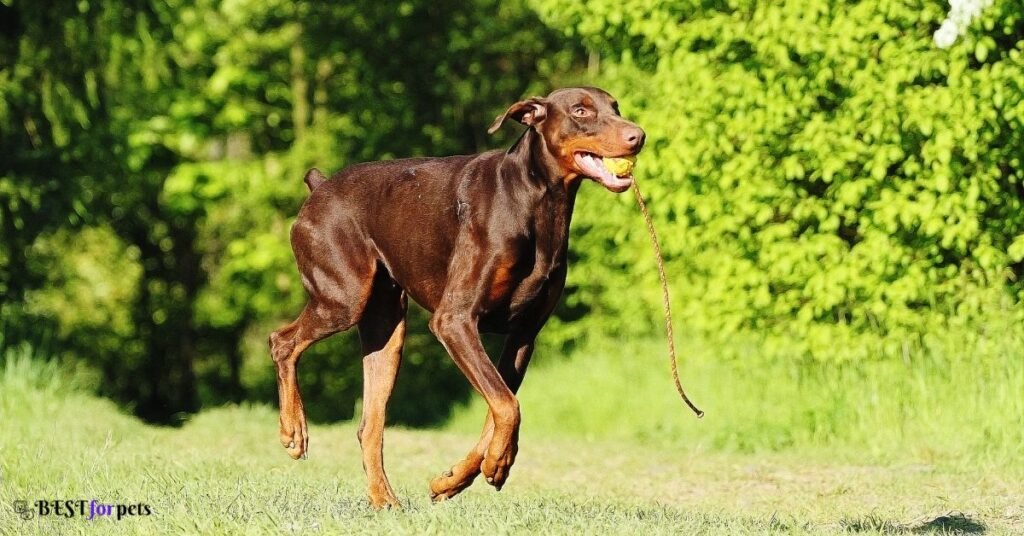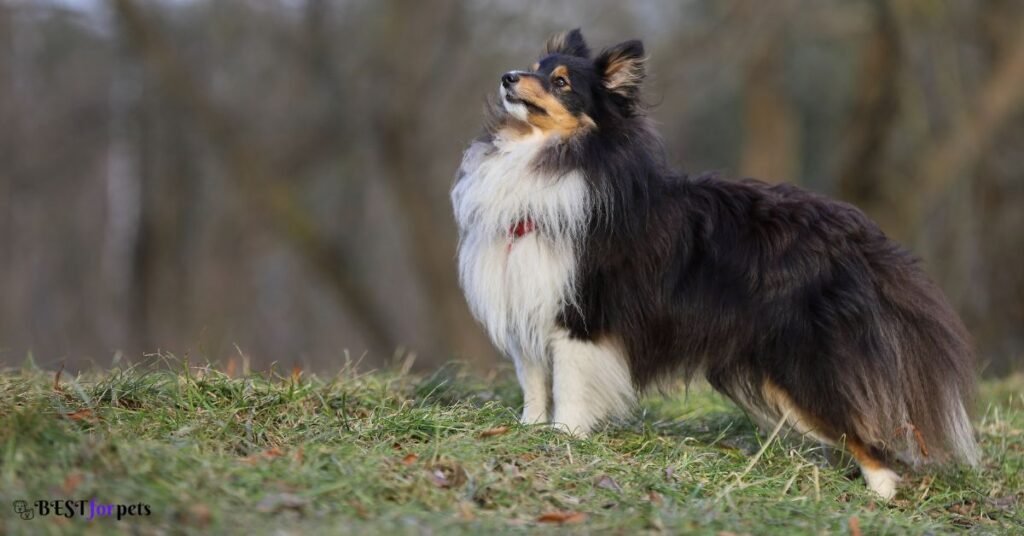List Of 10 Smartest Dog Breeds In The World
1. Golden Retriever
Golden Retrievers are not only renowned for their friendly and gentle nature but also for their intelligence. They consistently rank among the smartest dog breeds and possess a remarkable ability to learn and comprehend commands. Golden Retrievers excel in obedience training and are often seen participating in dog sports, such as agility and flyball.
They have an innate desire to please their owners, making them highly trainable and adaptable to various tasks. Golden Retrievers are often used in search and rescue operations due to their intelligence, excellent scenting abilities, and determination.
Furthermore, their intelligence extends to their interactions with children and other animals, as they have a gentle and patient demeanor. This combination of intelligence, adaptability, and affectionate nature makes Golden Retrievers a beloved choice for families and working roles alike.


2. Doberman Pinscher
The Doberman Pinscher is a breed that combines elegance with intelligence. These dogs are known for their exceptional problem-solving skills and sharp minds. They possess a high level of trainability and are quick to learn and respond to commands.
Dobermans excel in obedience training and are often used in roles such as police work and protection. Despite their intimidating appearance, Dobermans are highly loyal and make devoted family companions. Their intelligence and natural instincts make them adaptable to various tasks and environments, allowing them to thrive in both working and domestic settings.
3. German Shepherd
German Shepherds are renowned for their intelligence, versatility, and dedication to their owners. They are often utilized as police and military dogs due to their exceptional problem-solving abilities, quick learning, and loyalty. German Shepherds have a natural desire to work and thrive in tasks that require mental and physical challenges.
They excel in obedience training, tracking, and protection work. Their intelligence enables them to assess situations quickly and make informed decisions, making them reliable and trustworthy companions. German Shepherds form strong bonds with their families and are known for their protective nature. With the right training and socialization, they can excel in various roles, from family pets to working dogs, consistently proving their intelligence and adaptability.


4.Border Collie
Border Collies are widely recognized as the most intelligent dog breed. Their exceptional intelligence, coupled with their unwavering work ethic, makes them highly sought after for various tasks. Originally bred for herding livestock, Border Collies possess an incredible ability to problem-solve and learn complex commands quickly.
Their sharp minds and intense focus enable them to excel in obedience trials, agility competitions, and even advanced tricks. Border Collies thrive on mental stimulation and require plenty of exercises to keep their active minds engaged. Their intelligence, combined with their remarkable intuition and loyalty, makes them exceptional companions for experienced dog owners who can provide the mental and physical stimulation they need.
5. Poodle
Poodles are not only known for their unique, elegant appearance but also for their remarkable intelligence. They consistently rank among the smartest dog breeds and have a natural aptitude for learning. Poodles are highly trainable and excel in obedience training, making them a popular choice for dog shows and performances.
Their intelligence extends beyond obedience, as they can quickly pick up new commands and tasks. Poodles come in three sizes—standard, miniature, and toy—and regardless of size, they exhibit the same level of intelligence. This breed’s intelligence, combined with their friendly nature and versatility, makes them excellent family pets and working dogs in various fields, such as therapy, search and rescue, and assistance roles.


6. Shetland Sheepdog
The Shetland Sheepdog, affectionately known as the Sheltie, may be small in size, but their intelligence shines brightly. Shelties are incredibly quick learners and have a strong desire to please their owners. They excel in obedience training and agility competitions.
With their natural herding instincts, Shelties exhibit great problem-solving skills and can anticipate their owner’s needs. Their intelligence is matched by their unwavering loyalty, making them excellent family companions. Shelties thrive in environments that provide mental stimulation and enjoy tasks that challenge their intellect.
7. Labrador Retriever
The Labrador Retriever is not only one of the most popular breeds but also one of the smartest. Labradors possess a remarkable ability to learn and adapt, making them highly versatile working dogs. They excel in various tasks, including search and rescue, therapy work, and assistance roles.
Labradors have an innate desire to please their owners, which, combined with their intelligence, makes them highly trainable. Their problem-solving skills and quick learning abilities enable them to excel in obedience training. Labradors are not just intelligent but also known for their friendly and gentle nature, making them beloved family companions.


8. Papillon
The Papillon, named after its distinct butterfly-like ears, is a small breed with a big intellect. Don’t be fooled by their petite size; Papillons are incredibly intelligent and eager to learn. They excel in obedience training and agility competitions, showcasing their sharp minds and nimble bodies.
Papillons are quick problem solvers and possess excellent memory retention, allowing them to grasp new commands and tricks with ease. Their intelligence is matched by their outgoing and alert nature, making them wonderful companions for active individuals or families. Papillons thrive in environments that provide mental stimulation and enjoy participating in activities that challenge their intellect.
9. Rottweiler
The Rottweiler is a breed that combines strength, loyalty, and high intelligence. They are known for their sharp minds and quick learning abilities. With proper training and socialization, Rottweilers can be obedient and well-behaved companions.
Their intelligence allows them to excel in various tasks and roles, including police work, search and rescue operations, and competitive obedience competitions. Rottweilers have a natural protective instinct and are quick to assess situations, making them excellent guardians.
They are highly adaptable and can thrive in different environments, provided they receive mental stimulation and regular exercise. Rottweilers’ intelligence, coupled with their loyalty and determination, makes them a popular choice for those seeking a smart and capable canine partner.


10. Australian Cattle Dog
The Australian Cattle Dog, also known as the Blue Heeler or Queensland Heeler, is a highly intelligent and energetic breed. Originally bred for herding cattle, these dogs possess excellent problem-solving skills and a strong work ethic.
Australian Cattle Dogs thrive in mentally and physically challenging environments, making them perfect for active owners who can provide them with plenty of exercise and mental stimulation. Their intelligence enables them to learn new commands quickly and adapt to various tasks and activities.
Australian Cattle Dogs excel in obedience, agility, and even sports such as flyball and disc dog competitions. Their loyalty and eagerness to please make them great companions for active individuals or families looking for smart and energetic canine companions.
Why Intelligence Matters In Dogs
Intelligence matters in dogs for several compelling reasons. Here are some key points highlighting the importance of intelligence in our canine companions:
Trainability:
Intelligent dogs are typically more trainable. They have the capacity to understand commands and learn new behaviors quickly and efficiently. This makes training sessions more effective, enjoyable, and productive for both the dog and the owner. An intelligent dog can grasp concepts, follow instructions, and perform tasks with relative ease.
Problem-Solving:
Dogs with higher intelligence levels possess better problem-solving skills. They can assess situations, make informed decisions, and find solutions to challenges or puzzles. This ability is particularly valuable in working dogs, such as search and rescue dogs or assistance dogs, where critical thinking and decision-making can be vital.
Bonding and Communication:
Intelligent dogs are often more receptive to human communication and can interpret subtle cues and commands. This enhances the bond between the dog and their owner, fostering better understanding and cooperation. It allows for effective communication during training, play, and everyday interactions.
Adaptability:
Intelligent dogs are generally more adaptable to different environments, routines, and stimuli. They can quickly adjust to changes, new experiences, and challenges. This adaptability makes them more versatile and capable of handling various tasks or situations, whether it’s in a working role or as a family pet.
Mental Stimulation:
Intelligent dogs have a greater need for mental stimulation. They thrive when presented with engaging activities, puzzle toys, and interactive games that challenge their intellect. Mental stimulation not only prevents boredom and destructive behavior but also promotes overall mental well-being and reduces the risk of cognitive decline in older dogs.
Versatility:
Intelligent dogs are often highly versatile in their abilities. They can excel in different fields, including obedience, agility, tracking, therapy work, and more. Their intelligence allows them to adapt to various roles and tasks, making them valuable and well-rounded companions.
Problem Prevention:
Dogs with higher intelligence levels are often more capable of assessing and avoiding potential dangers or risky situations. Their ability to learn and remember commands or cues helps prevent accidents, keep them safe, and reduce unwanted behaviors.
Tips to enhance your dog’s Intelligence
Developing intelligence in dogs involves a combination of proper training, mental stimulation, and socialization. Here are some tips to help you enhance your dog’s intelligence:
Start with Basic Training:
Begin by teaching your dog basic commands such as sit, stay, come, and down. Use positive reinforcement techniques, such as treats and praise, to reward desired behaviors. Consistency and patience are key in training.
Provide Mental Stimulation:
Engage your dog in mentally stimulating activities to keep their mind sharp. This can include puzzle toys, treat-dispensing toys, interactive games, and scent work. Rotate toys regularly to keep their interest levels high.
Teach New Tricks:
Dogs love learning new things. Teach them fun tricks like roll over, shake hands, or fetch specific objects. This not only enhances their problem-solving skills but also strengthens the bond between you and your dog.
Use Food-Dispensing Toys:
Use food-dispensing toys or Kong toys stuffed with treats or kibble to challenge your dog’s problem-solving abilities. They will need to figure out how to manipulate the toy to release the food, keeping them mentally engaged.
Incorporate Obedience Challenges:
Once your dog has mastered basic commands, introduce more complex obedience challenges. This can involve adding distractions, increasing the distance, or combining commands. This keeps them focused and sharpens their ability to follow instructions.
Provide Regular Exercise:
Physical exercise is important, but mental exercise is equally crucial. Take your dog on walks, engage in interactive play sessions, and provide opportunities for them to explore new environments. A tired dog is more receptive to learning and mental stimulation.
Socialize Your Dog:
Expose your dog to various social situations, other dogs, and different environments from an early age. This helps them develop confidence, adaptability, and problem-solving skills when faced with new experiences.
Rotate Training Sessions:
Avoid repetitive training routines. Dogs thrive on novelty and challenges. Mix up training sessions by introducing new commands, varying the training location, or using different training techniques.
Be Patient and Positive:
Patience is key when developing intelligence in dogs. Celebrate small achievements and avoid punishment-based training methods. Positive reinforcement and rewards for good behavior encourage continued learning and a positive attitude toward training.
Frequently Asked Questions
Are all intelligent dog breeds easy to train?
While intelligence is a factor in trainability, it does not guarantee that all intelligent dog breeds will be easy to train. Each dog has its own personality, temperament, and individual learning style. While intelligence can make training more efficient, factors such as consistency, positive reinforcement, and proper socialization also play a crucial role in successful training.
Can any dog become intelligent with training?
While training can enhance a dog’s abilities and cognitive skills, the level of innate intelligence is primarily determined by the breed’s genetic makeup. Some dog breeds are naturally inclined to be more intelligent and trainable due to their breeding history and purpose. However, all dogs can benefit from training and mental stimulation, regardless of their innate intelligence level.
How can I stimulate my dog’s intelligence?
There are several ways to stimulate your dog’s intelligence. Engage in regular training sessions using positive reinforcement techniques to teach new commands and behaviors. Introduce puzzle toys and interactive games that require problem-solving skills. Provide daily exercise and mental enrichment activities, such as scent work, obedience trials, agility courses, or trick training. Regular socialization with other dogs and new environments can also help stimulate your dog’s intelligence and adaptability.
Are there any downsides to owning an intelligent dog?
Intelligent dogs often have high energy levels and require mental and physical stimulation to prevent boredom and potential behavior issues. They may become frustrated or develop destructive behaviors if their mental needs are not met. Additionally, intelligent dogs may require more mental engagement and training to keep them mentally satisfied. It’s essential to provide sufficient exercise, mental enrichment, and training opportunities to ensure their well-being.
Are there intelligence differences within a breed?
Yes, there can be individual variations in intelligence within a breed. While certain breeds are generally known for their intelligence, each dog within that breed may have its own unique level of intelligence, trainability, and problem-solving skills. Factors such as genetics, early socialization, and individual temperament contribute to these variations.

